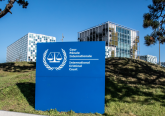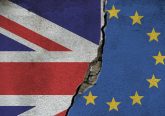 It might be thought that there would be little need for a post on this blog about the arrival of the royal baby. The new Prince of Cambridge – Your Highness, to his friends – is unlikely to play a significant constitutional role for sometime to come. I found myself wondering, though, what the constitutional situation will be when, and if, he finally comes to the throne. So, here is the post I plan to write in 2075 – and the way academic pensions are going, I will probably still be working then.
It might be thought that there would be little need for a post on this blog about the arrival of the royal baby. The new Prince of Cambridge – Your Highness, to his friends – is unlikely to play a significant constitutional role for sometime to come. I found myself wondering, though, what the constitutional situation will be when, and if, he finally comes to the throne. So, here is the post I plan to write in 2075 – and the way academic pensions are going, I will probably still be working then.
To some, it may come as a surprise that Britain continues to be a monarchy. We escaped, or missed, the tide of republican constitutional reform that followed the death of Queen Elizabeth in the middle third of the century. Australia and Jamaica were the first to go, followed, like a line of falling dominos, by Canada, and then by New Zealand. Other territories followed suit, with most adopting an elected head of state or – more simply still – combing the role of head of state with that of prime minister. However, it is still the case that the sun never fully sets on our new King’s realms: some small territories decided, for economic and foreign policy reasons, to retain the royal connection. And the Privy Council, acting as their highest court, still provides a useful guarantee of legal certainty to the owners of the many corporations nominally residing on these islands. Like these micro-realms, we in the United Kingdom have retained our monarchy. This is only partly through choice: the moment has never seemed quite right for a public discussion of the wider issues raised by an hereditary head of state, there always seems to have been more important matters to worry about. It could well be said that it is apathy, rather than a commitment to royalism, than has allowed the institution to last this long.
Within the United Kingdom, the King inherits a fractious and diverse realm. Scotland will undertake its 10th vote on independence from the Union this coming autumn, and the low-levels of likely voter turn out make it hard to predict the outcome. For many years, the royal family has worked hard to maintain the Union – without, of course, ever stating this position publically – and conferral of the title of ‘Duke of Edinburgh’ on the heir apparent reflects this commitment. A popular argument in favour of the monarchy is that it serves this unifying function, bringing the United Kingdom together. However, it has been hard to avoid the impression in the last fifty years or so that the royal family is tied to England, and based in London. The former monarch regularly attended the openings of the English Parliament and, of course, of our federal, British, Parliament, but was less commonly seen in the Scottish and Welsh Parliaments. Whilst the nationalist movement in Scotland remains formally committed to the monarchy, it is hard to believe this commitment is very deep. If – or, perhaps, when – Scotland finally votes for independence, it is likely to reassess its connection with royalty.
The King takes the throne following the abdication of his father. It might reasonably be asked if we now have enough evidence to talk of a ‘convention’ of abdication. Queen Elizabeth was the last monarch to reign until her death – though for the last ten years or so of her life Prince Charles acted as regent in all but name. He abdicated shortly afterwards, having reigned for only a year, citing old age and a passionate desire to express his opinions about a wide range of matters more openly. The new King’s father, the former Prince William, has just stepped down at the ripe old age of 91, having served for about 40 years. Abdication seems to have become the standard way for the Crown to pass between generations.
The need for abdication as a regular feature of constitutional monarchies became apparent in the first half of this century. The monarchies of the Netherlands andBelgium began this trend. The ever-improving standards of healthcare – and the healthy lives led by the privileged sections of society from which monarchs are drawn – necessitated abdication as a standard constitutional device. It became evident that without abdication states risked a succession of extremely elderly kings and queens, as the crown was passed from centenarian to octogenarian. Can we now say that there is a convention in the United Kingdom that the Monarch will step down on reaching old age? If this is a convention, there is a substantial amount of uncertainty involved in it. It does seems that the Monarch will step aside when he or she feels that age is inhibiting her work, but whether that is 85 – as with Charles – or 91 – as with William – depends on the holder of the office and the pressure they are subjected to by the wider political community. Perhaps a better – and more humane – approach would be to set a statutory retirement age for the monarch. He or she would be compelled to stand aside, even if still capable of undertaking the duties of the office.
It might be objected, though, that the capacity to choose the date of their retirement is pretty much the last constitutional power that the Monarch possesses. Removing this choice would leave the Monarch completely powerless, little more than a national mascot. A clear trend of the twenty-first century has been the steady reduction in the political power and influence of the Monarch. Most of the Monarch’s legal powers were lost by the start of the century – the prerogatives of the Crown were and still are exercised by those accountable to the Parliaments of the United Kingdom – but the Monarch’s political influence has also declined. This is partly due to the holders of the office. Queen Elizabeth – it subsequently transpired – had been able to exercise a small, but significant, influence on government policy. Her weekly meetings with the Prime Minister combined with her understanding of politics and wide public popularity enabled her to shape some aspects of public policy under some prime ministers. Her successors had far less clout. The emergence of Prince Charles’ letters to Ministers – after many court battles – did not present him in an attractive light. His views on farming, hunting, and – most damningly – homoeopathy did not enhance his public position. For the short period he was monarch, he had little influence; ministers were keen to distance themselves from his views. And when Prince William then took the throne it seems he had little interest in the detail of public affairs, content to leave matters entirely to the elected part of the constitution. Perhaps wisely, he may have concluded that to exercise influence, or even to seek to exercise influence, was – first – likely to be leaked to the public, and – second – likely to harm the institution of the monarchy.
A further reason for the decline in royal power, and one that was not predicted at the time, was the shift of the United Kingdom to a formal federal structure in the middle part of the century. The Prime Minister of the United Kingdom still has regular meetings with the Monarch, but many of the important day-to-day decisions are made by the first ministers of England, Scotland, Wales, and Northern Ireland. It could easily be argued that the Prime Minister exercises substantially less power that any of these other four. Indeed, the United Kingdom Parliament, and government at the United Kingdom level, is often very weak. When the first ministers collectively decide on a policy, the United Kingdom Prime Minister is almost always compelled to accept their decision. Even in matters of foreign policy, England and Scotland have – through offices overseas that are embassies in all but name – often as much influence as the formal representatives of the United Kingdom.
A possible corollary of this decline in power has been a decline in the heir apparent’s willingness to avoid making politically controversial statements. Whilst his father was noted for his public restraint, our new King has spoken out on many issues – feeling, perhaps, that if he will be denied influence whilst in office, he should at least be allowed to express his views like any other citizen. It has even been argued that along with the decline in royal power should come the right to vote: if our new King lacks special constitutional powers, why shouldn’t he at least enjoy the ordinary constitutional power the rest of us exercise?
In conclusion, as we start to look forward to the invigorating spectacle of the coming coronation – and turn our eyes away from the un-inspiring stories of the scandals surrounding the next generation of royalty – it might now be time to ask whether monarchy is really a fit institution for the coming twenty-second century. True, some of the oddities have ended. The Monarch is no longer the head of the Church of England – a divorce that brought great relief to each party – and no longer has any real political power. But we might still worry about the symbolism of having a head of state who is always drawn from the most privileged part of our society. More pressingly, perhaps, we might also worry about the unfair and unhealthy pressure that this puts on holders of this office. Our new King has had to put up with 62 years of relentless scrutiny, and his capacity to choose his own path in life has been radically constrained. Maybe, in 2075, it is time to think – cautiously – about change.
This post first appeared on the blog of the UK Constitutional Law Group.







No Comment